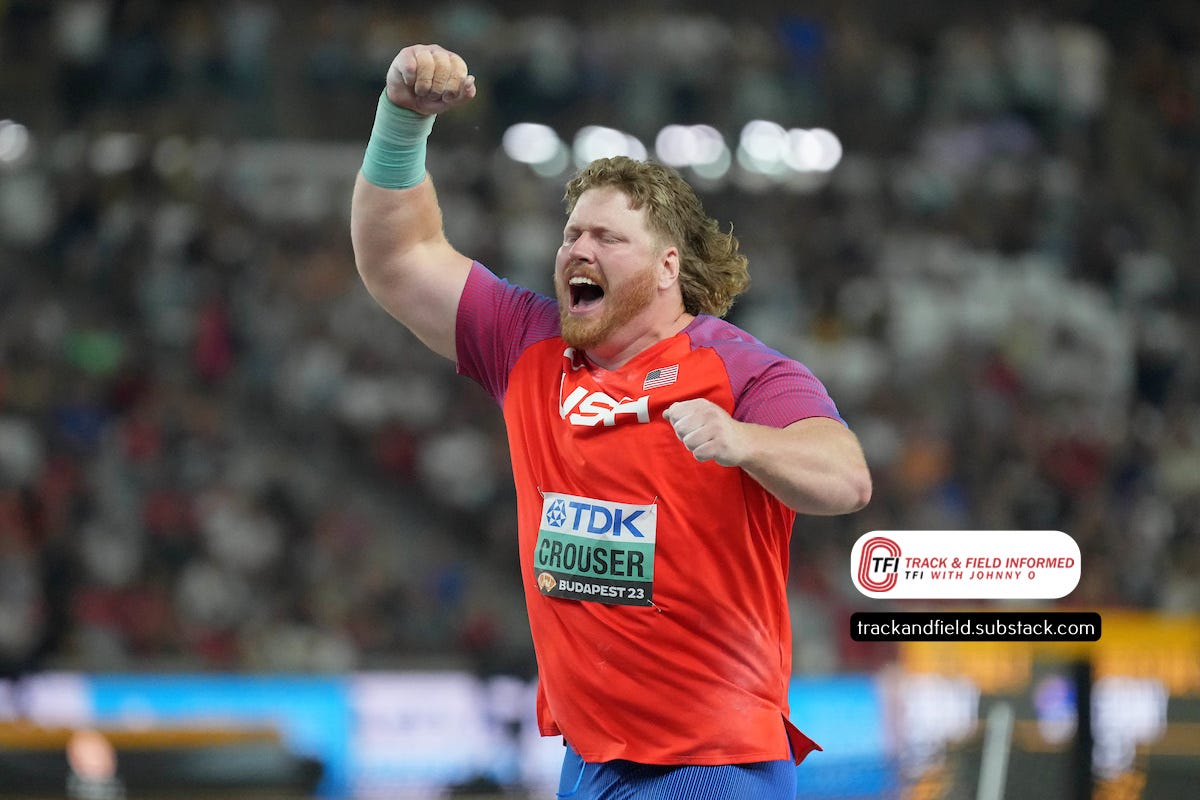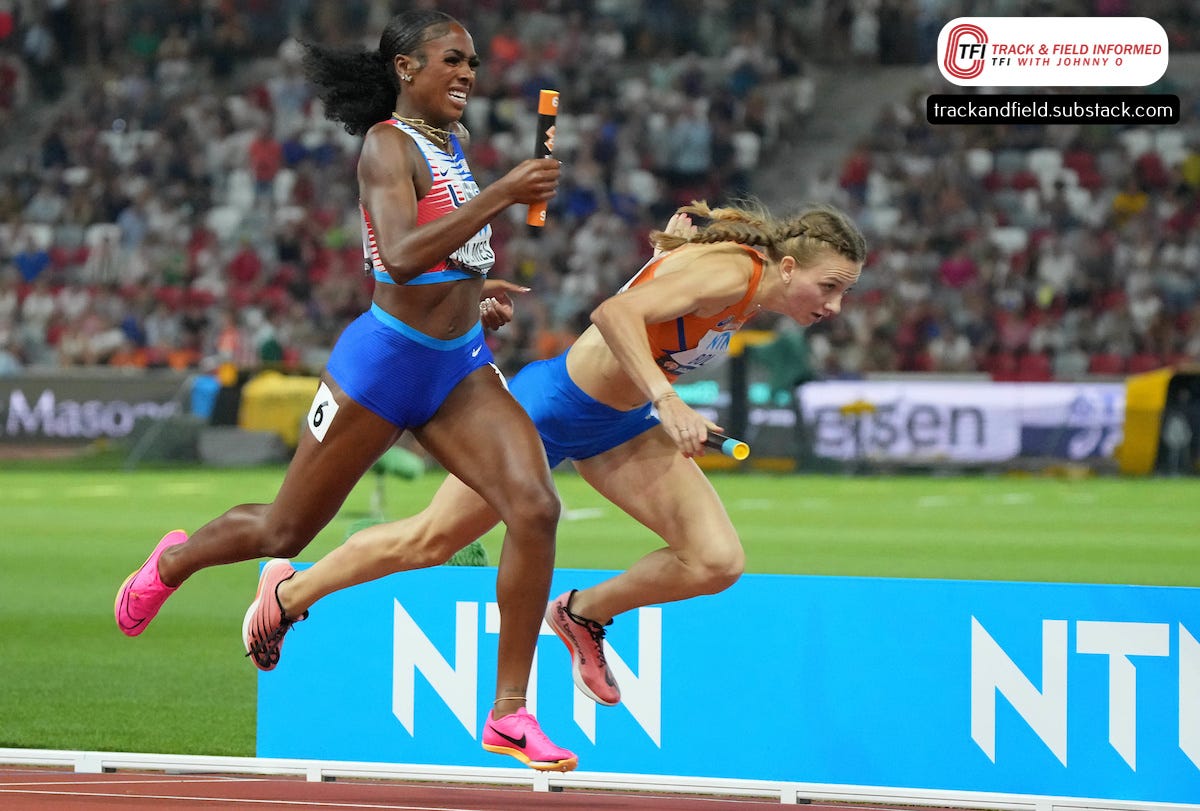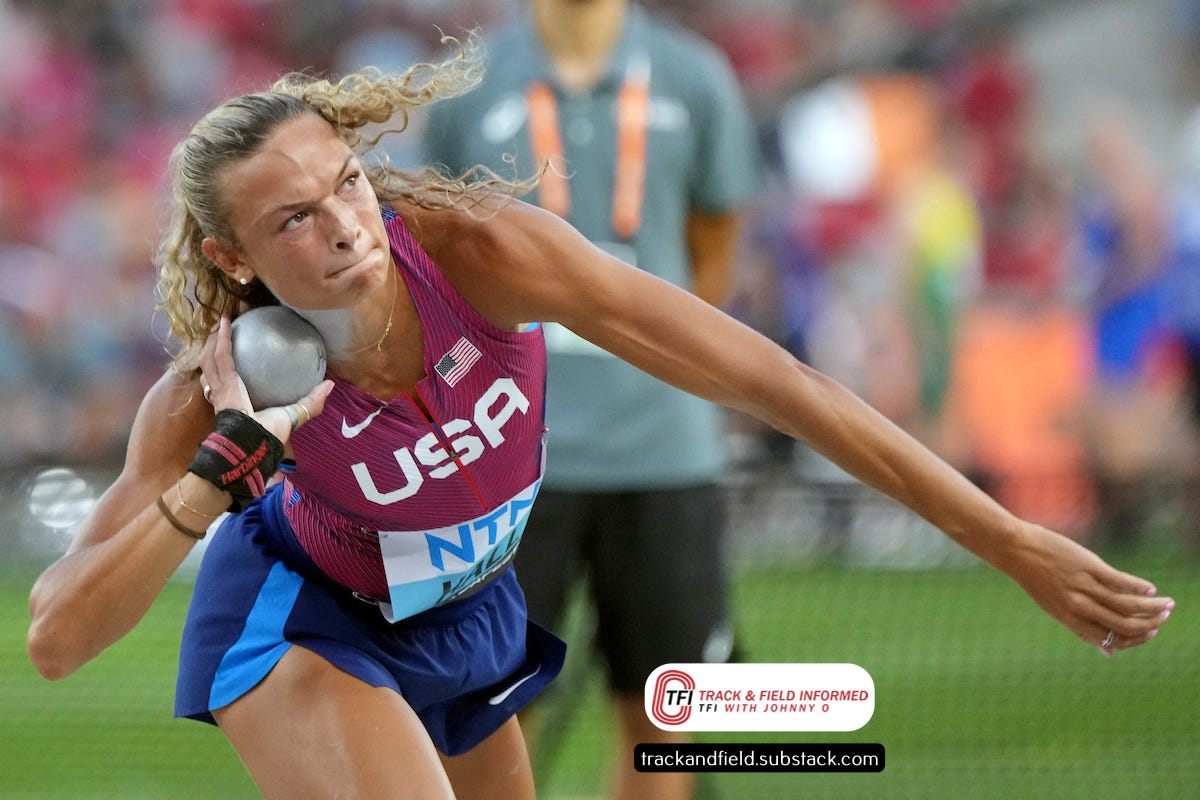Crouser comes through in clutch once again
His performance in World Champs adds to legacy as greatest spot putter of all time

BOOM! BOOM! BOOM! THAT WAS BIG!
Those were the words I spoke — make that pretty much yelled — at the television after watching Ryan Crouser unleash a huge effort on the final throw of the men’s shot put competition in the World Athletics Championships in Budapest, Hungary on Saturday.
Crouser, the two-time Olympic champion, had been heavily favored to win his second consecutive World title as recently as Thursday night. But then he revealed in a social media post on Friday that he had recently been diagnosed with two blood clots in his lower leg, but he was planning to compete in the meet. He wrote in the post that he had been experiencing persistent pain in a calf muscle during the previous 20 days and he originally thought it was a strained muscle. But when it didn’t go away after extensive treatment, tests that were conducted shortly before he was supposed to leave for Budapest revealed the blood clots.
Consultations with his medical team and his family led to plans to treat the clots and compete in the meet as planned. But he did not sound all that confident about how would he would fare while talking with NBC Sports, basically saying he was just glad to be able to take part in the meet.
But after advancing to the final with a single put of 21.48 (70-5¾) during the morning qualifying round, the competitive juices that Crouser seems to possess in abundance began to kick in when it was time to compete for the gold medal.
He took the lead on his initial put in the first round with an effort of 22.63 meters (74 feet 3 inches), despite the fact that he appeared to be holding back. He got more aggressive in the second round and the result was a 22.98 (75-4¾) effort that broke the meet record of 22.94 (75-3¼) that he had set in winning his first World title last year in the meet in Eugene, Oregon.
A put of 22.28 (73-1¾) in the third round was followed by a pair of fouls in rounds four and five. But knowing that the gold medal was his as he stepped into the ring for the final throw of the competition, he threw caution to the wind. He knew it was a great put the second the shot left his right hand and immediately raised his arms in celebration before completing his follow through. He then took a few steps away from the shot put circle, fell to his knees and raised his arms in celebration.
His effort measured a whopping 23.51 (77-1¾), the second-farthest put in history and only five centimeters short of the 23.56 (77-3¾) world record he had set in the Los Angeles Grand Prix at UCLA on May 27. It also left him well over a meter in front of surprise silver medalist Leonardo Fabbri of Italy, whose 22.34 (73-3½) effort was the first 22-meter put of his career. Joe Kovacs, the 2015 and 2019 World champion and the silver medalist behind Crouser in the Olympic Games and last year’s World Championships, finished third at 22.12 (72-7).
“That was a tough one. The last throw was testament to all the hard work and dedication over the last year," he was quoted as saying in a Reuters story. “The last few days have been hard, so with all that has happened it was a phenomenal throw.
"It's been the most stressful 20 days I've ever had. The week before I was supposed to leave I woke up with calf pain and we thought I had a partial tear in my calf. We treated it like that but after 10 days of no improvement we had a doctor look at it and he said you have two blood clots.
"Luckily I had a great medical team working with me and they got me safe to fly so it felt like a relief just to get here, even though I didn't have proper training or preparation.
"After all that it was the best performance of my life, given the health issues, the stress and all of it. It wasn't quite a world record but to me it was."
Already regarded by many track and field historians as the greatest shot putter in history, Crouser’s performance on Saturday further cemented his competitive legacy. It also increased his dominance of the all-time world list as he now has 9 of the top 11 puts in history and 20 of the top 24.
The men’s shot put was one of four finals contested on the first day of the nine-day meet.
In the others, the U.S. set a world record in winning the mixed sex 1,600-meter relay, Gudaf Tsegay led an Ethiopian sweep of the medals in the women’s 10,000 meters, and Alvaro Martin of Spain won the men’s 20-kilometer walk.
In addition, Anna Hall of the U.S. was in first place after the first four events of the heptathlon.

The mixed 1,600 relay and the women’s 10,000 both provided dramatic finishes in which revered Dutch athletes fell to the track as they tried to reach the finish line while they were involved in tight races.
The women’s 10,000, which was held before the mixed 1,600 relay, was billed as a race between the first-, second-, and fourth-fastest runners in history. However, the pace was painfully slow for much of it before things picked up dramatically during the last kilometer.
Defending champion and world-record-holder Letesenbet Gidey of Ethiopia was in the lead with 400 meters to go, but Sifan Hassan of the Netherlands moved into first place heading into the final curve. Gidey was losing ground at that point, but countrywoman Tsegay was hot on Hassan’s heels.
It appeared as though Hassan might be able to repel Tsegay’s charge with about 60 meters left in the race. But Tsegay began to reduce her deficit and Hassan began to drift toward her right. The two runners briefly made contact when Hassan extended her right arm outward as Tsegay began to pull even with her. Hassan then appeared to either catch her spikes on the track or simply stumble and she went down hard.
While Tsegay, the winner of last year’s meet in the 5,000, sprinted ahead to cross the finish line in 31:27.18, Gidey and fellow Ethiopian Ejgayehu Taye were not far behind her and finished in 31:28.16 and 31:28.31, respectively.
Hassan eventually regained her feet and finished 11th in 31:53.35.
“It was a good race with an amazing finish,” Tsegay was quoted as saying in a World Athletics post. “The 10,000 is not my usual event. I like 1,500 and 5,000 much more, but now I feel very special as I have managed to add one more world title at a different distance.”
Tsegay and Hassan are both entered in the 5,000 later in the meet, and Hassan ran in the final of the 10,000 after winning a first-round heat of the 1,500 earlier in the day.
Hassan had previously won the 5,000 and 10,000, and placed third in the 1,500 in the Olympic Games in Tokyo in 2021. But her fall on Saturday night prevented her from winning a medal of any kind in the 10,000.
“I am keeping my smile, but it is really hard,” Hassan said in the World Athletics post. “I am very disappointed. This is sport, these things happen. I just had a bad moment. I felt really strong and I tried to push on the last lap.
“I do not think I am injured. My hand is okay, but the knee needs to be checked. Hopefully, all is good.”
The mixed 1,600 relay, which features men running the first and third legs and women running the second and fourth, was first contested at a global title meet in the 2019 World Championships in Doha, Qatar. A U.S. team won that inaugural race, but had finished third in both the Olympic Games in 2021 and in the World Championships last year.
U.S. anchor runner Kennedy Simon was passed by Dominican Republic anchor runner Fiordaliza Cofil and Dutch anchor woman Femke Bol in the last 20 meters of the race last year. But on Saturday, it was Bol, the world-record-holder in the 400 meters indoors and the second fastest 400 hurdler in history outdoors, who was losing ground during the final 20 meters of the race. That led to her leaning forward in an effort to cross the finish line first and she crashed to the track with about five meters left in the race as Alexis Holmes of the U.S. sped past her.
Bol initially got to her feet quickly enough to cross the line in third place, but the Netherlands was disqualified because Bol had dropped the baton as she was falling to the track.
The U.S. team of Justin Robinson, Rosey Effiong, Matthew Boling, and Holmes ran 3:08.80 to lower the world record of 3:09.34 set by the U.S. team in winning the race in the 2019 World Championships.
“I do not know what happened,” Bol said in a World Athletics post. “It has never happened to me before. I cramped towards the finish line. I was pushing, pushing, pushing. I was disappointed that my body did not have it in me to finish the race strongly.”

Martin had a strong finish in the men’s 20-kilometer walk and it enabled him to move past leader Koki Ikeda of Japan with five kilometers remaining in the race.
Martin had placed fourth, two places behind Ikeda, in the Olympics in 2021, so he was ecstatic when he crossed the finish line first with a time of 1 hour 17 minutes 32 seconds, the fastest in the world this year.
Perseus Karlstrom of Sweden placed second in 1:17:39, followed by Caio Bonfim of Brazil in 1:17:47.
“I was fourth at the last Olympics Games, I missed the bronze which motivated me to work hard,” he said on a World Athletics post. “In Tokyo, I felt when I was in the fourth position that I could win a medal. Unfortunately, it did not happen and that is why this gold medal is next step towards the next Olympic Games.
“I had an amazing race today, I did not expect to finish this fast, it is amazing. I cannot express all my feelings right now, it feels like a dream.”
Hall was the favorite in the heptathlon so it was not a surprise when she ended Saturday in first place with 3,998 points, 93 points ahead of second-place Katarina Johnson-Thompson of Great Britain.
But it was unexpected to see her U.S. teammates, Chari Hawkins and Taliyah Brooks in third and fourth place with 3,900 and 3,888 points, respectively.
Brooks, Hall, and Hawkins started the competition by posting the three fastest times in the 100-meter hurdles with marks of 12.78, 12.97, and 13.04, respectively, and they kept the momentum rolling from there.
Hall and Hawkins each cleared 1.83 (6-0) in the high jump with Brooks at 1.80 (5-10¾). They each produced a personal best in the shot put as Hall’s top put was 14.54 (47-8½), Hawkins was at 14.40 (47-3), and Brooks was at 13.45 (44-1½).
The first day concluded with the 200, in which Hall ran 23.56, Brooks ran 23.85, and Hawkins clocked 24.38.
Johnson-Thompson, the 2019 World champion, had marks of 13.50 in the 100 hurdles, 1.86 (6-1¼) in the high jump, 13.64 (44-9) in the shot put, and 23.48 in the 200.
First-round heats were held in the men’s 100, men’s and women’s 1,500, and men’s 3,000 steeplechase on Saturday and nearly all of the favored performers advanced to the semifinals or the finals in the case of the steeplechase.
One exception was Cravont Charleston of the U.S. in the 100. He finished first in the USA Track & Field Outdoor Championships on July 7, but he finished a non-qualifying fifth in his heat in 10.18.
Oblique Seville of Jamaica, fourth in the 100 in the World Championships last year, posted the fastest qualifying time in that event at 9.86. Olympic champion Marcell Jacobs of Italy advanced out of his heat with a third-place time of 10.15, but based on the effort he needed to put forth, he might be hard-pressed to make it through the semifinals to the final, which is scheduled to be run at 1:10 p.m., Eastern Daylight Time, on Sunday.
When it came to field events, qualiyfing rounds were held in the men’s triple jump, discus and hammer throw, and in the women’s long jump.
Jaydon Hibbert of Jamaica had the top mark in the triple jump at 17.70 (58-1) and Ethan Katzberg of Canada led qualifying in the hammer throw with a national record of 81.18 (266-4).
Tara Davis-Woodhall of the U.S. led qualifying in the women’s long jump with a leap of 6.87 (22-6½).



